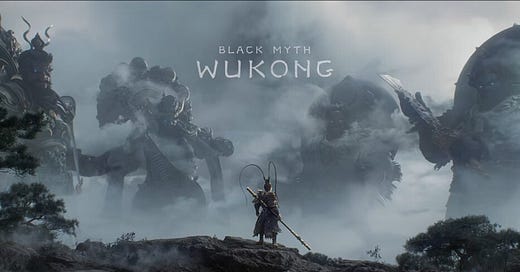“Black Myth: Wukong” Ignites Gaming Surge and Tourism Boom in China
The release of the highly anticipated video game “Black Myth: Wukong” has sparked a wave of consumer activity across China, boosting video game sales and driving a surge in tourism, particularly to historical sites featured in the game.
According to data from Alibaba Group’s e-commerce and travel platforms, the game’s impact has been felt far beyond the virtual world.
Video Game Sales Skyrocket
On the day of its release, “Black Myth: Wukong” caused a significant increase in video game-related purchases on Alibaba’s Taobao platform, a major C2C e-commerce site in China, according to Alibaba’s blog Alizila.
Video game sales on Taobao surged by 130% compared to the previous week, while searches for the game title spiked nearly 14 times. The game has captured the attention of Chinese gamers with its immersive graphics and engaging storyline based on the classic Chinese novel “Journey to the West”.
The demand for gaming consoles also saw a notable increase, with PlayStation 5 (PS5) sales doubling year-on-year in the week leading up to the game’s release.
The console maintained the top spot in Tmall’s video game equipment rankings for four consecutive days, reflecting the growing enthusiasm for high-quality gaming experiences among Chinese consumers.
Tmall’s game consoles category reported an 80% year-on-year increase in sales, further underscoring the game’s influence on the market.
Additionally, Alibaba’s second-hand trading platform Xianyu experienced a 300% increase in searches for PS5 consoles in August, highlighting the widespread interest in gaming hardware.
Tourism Boom in Shanxi Province
Beyond the gaming sector, “Black Myth: Wukong” has also reignited interest in China’s rich cultural heritage, particularly in Shanxi province.
The game’s stunning visuals, inspired by Shanxi’s ancient temples, carved grottoes, and rugged mountains, have captivated players and spurred a tourism boom in the region. On Fliggy, Alibaba’s online travel platform, searches for Shanxi locations and accommodations doubled month-on-month on the day of the game’s release.
The province, home to three UNESCO World Heritage Sites and the only remaining structures from the Tang dynasty, has seen a 70% year-on-year increase in tourism bookings this summer, according to Fliggy.
This surge includes ticket orders and car rentals, indicating a broad interest in exploring the historical and cultural sites depicted in the game.
Many netizens from Beijing, as well as residents from Shanghai, Zhejiang, and Henan, have been driving searches for Shanxi destinations on Fliggy, eager to experience the real-life locations that inspired the game’s enchanting world.
Keep reading with a 7-day free trial
Subscribe to China Innovation Watch to keep reading this post and get 7 days of free access to the full post archives.



